General Psychology Human Memory Lecture 55 1. 1.

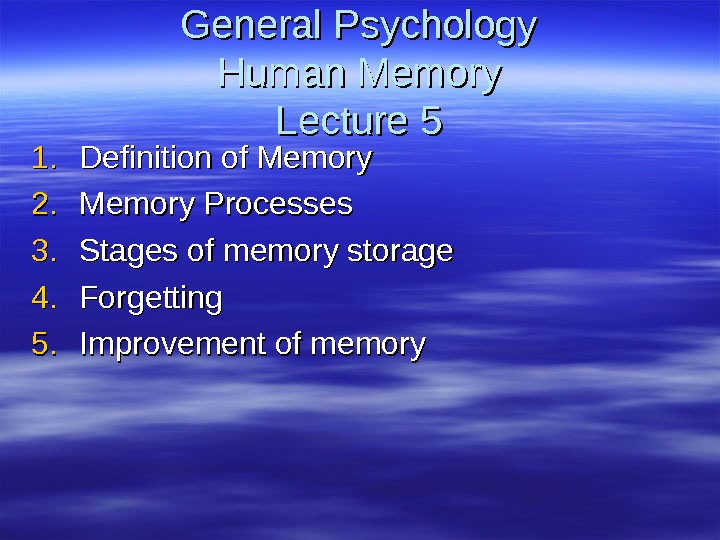
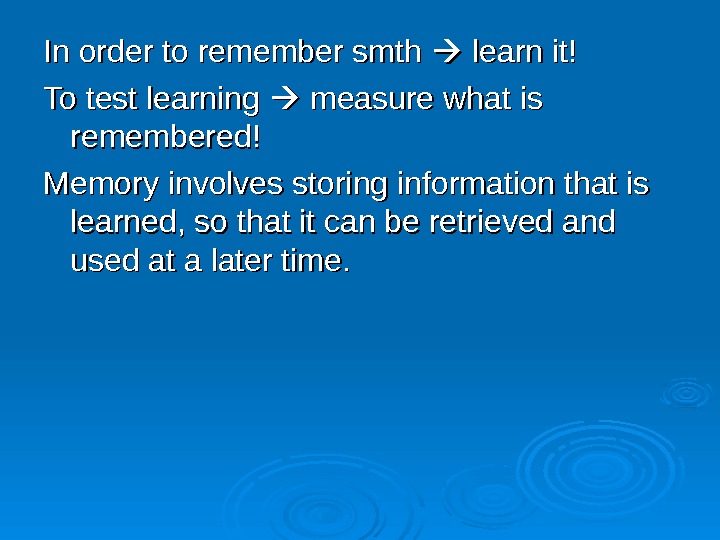
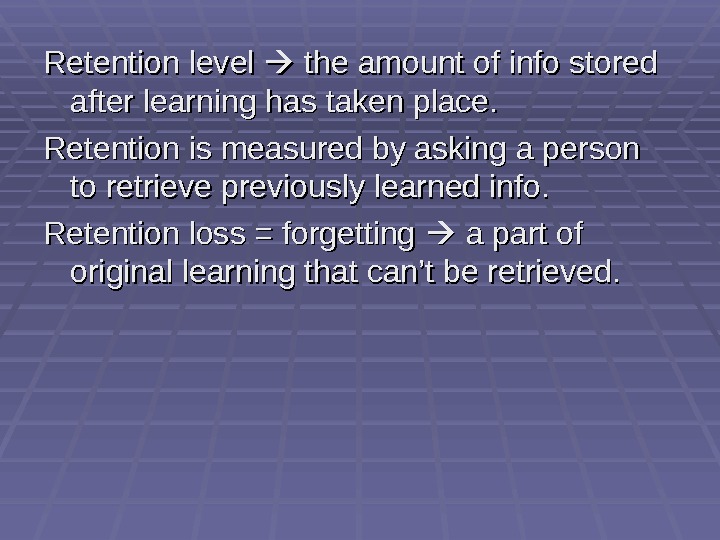
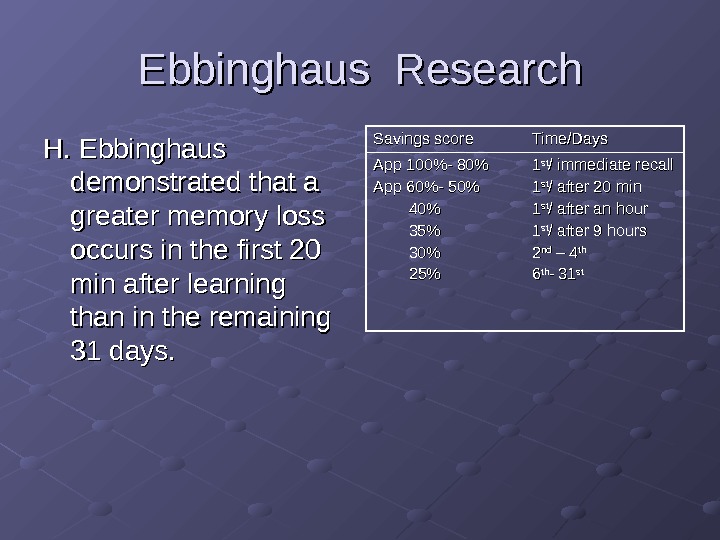
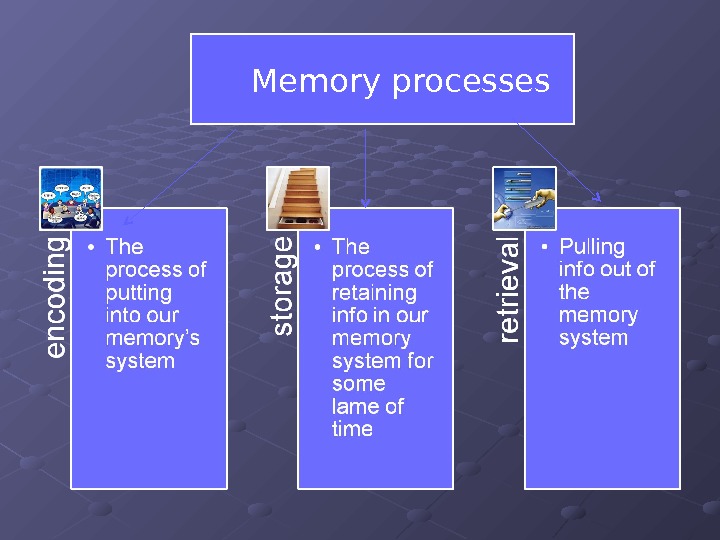
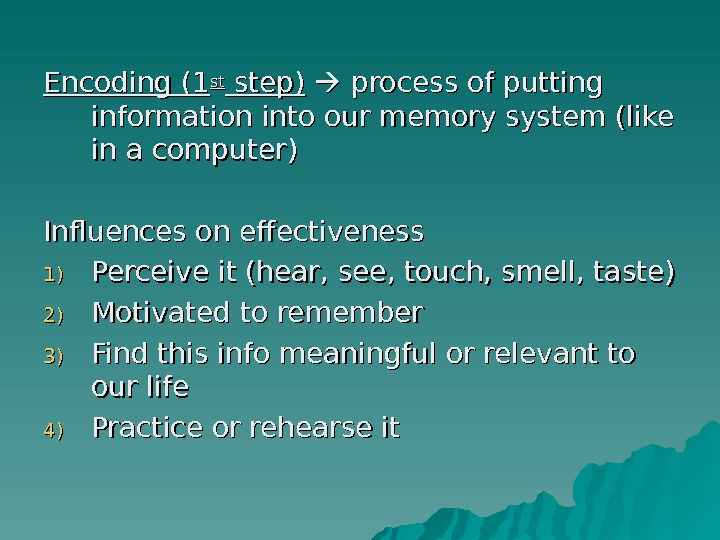
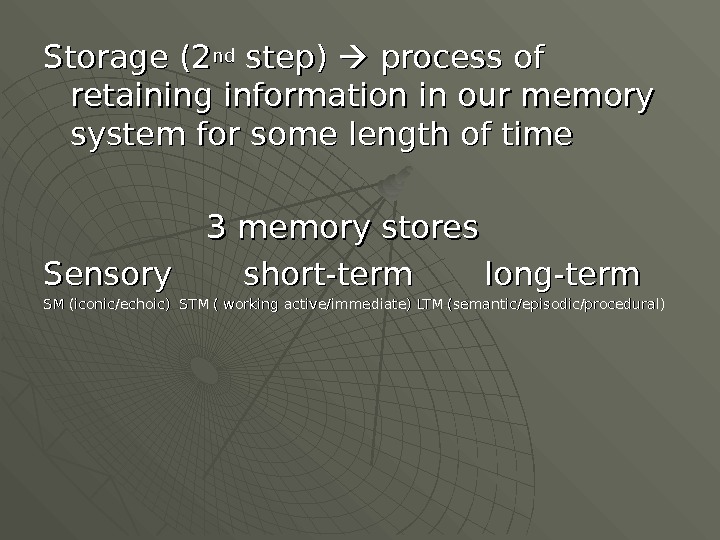
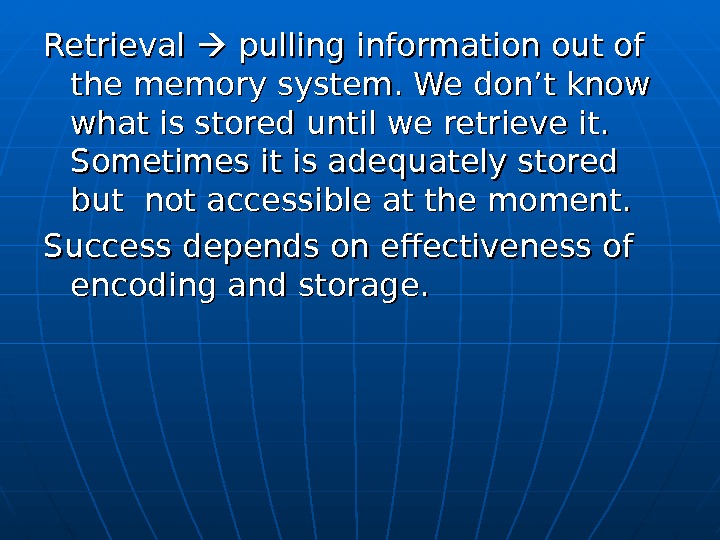
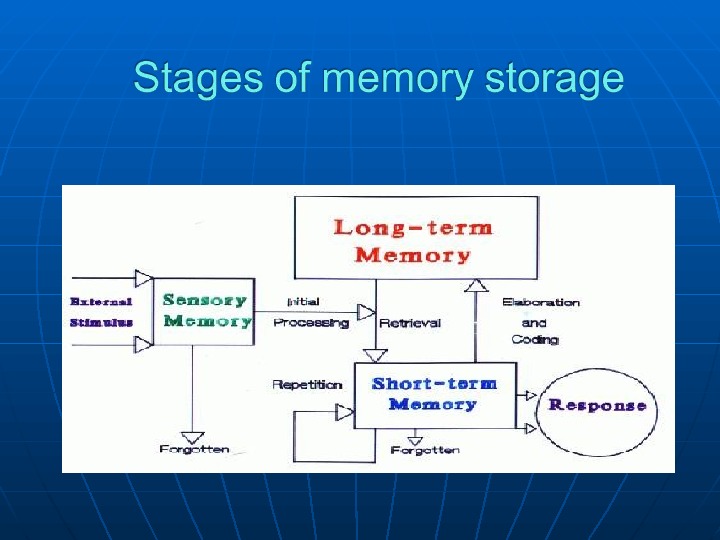
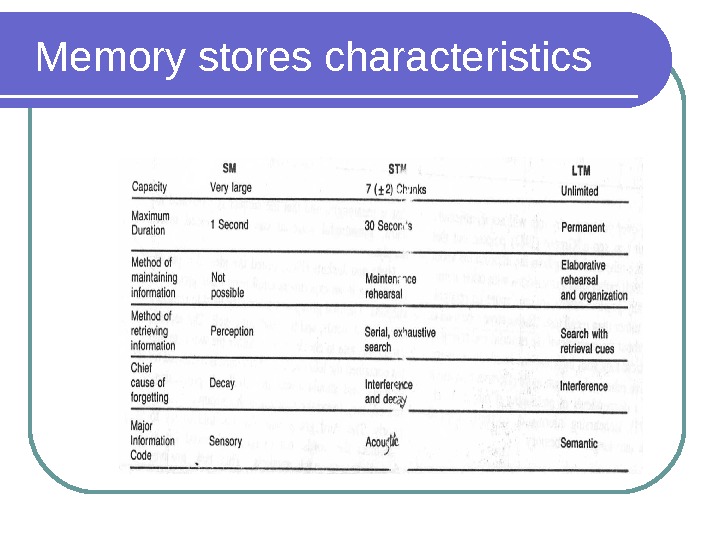
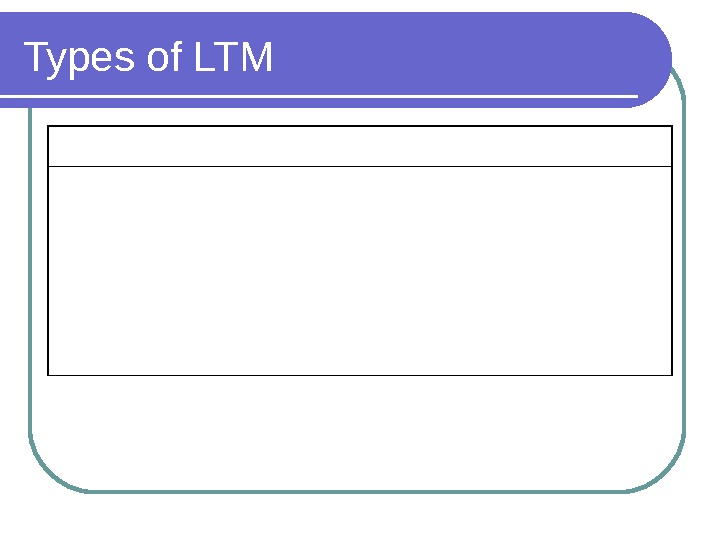
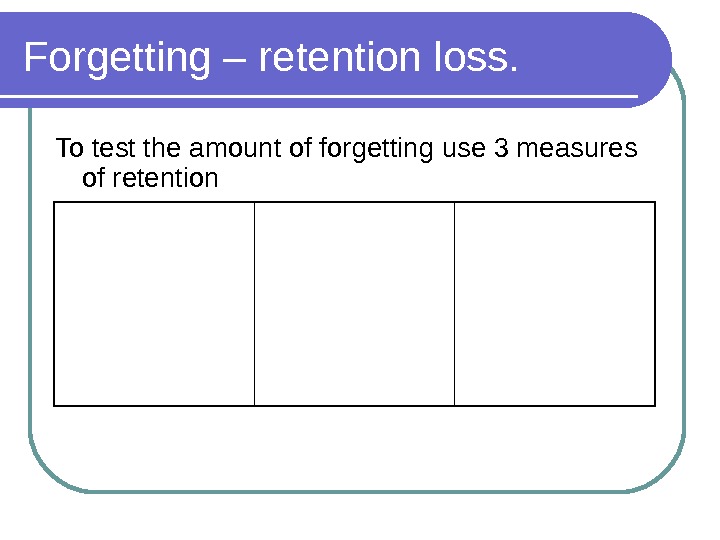
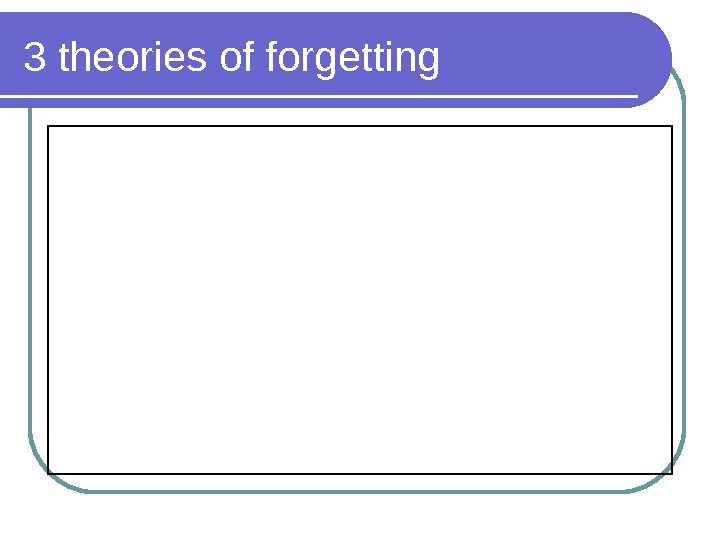
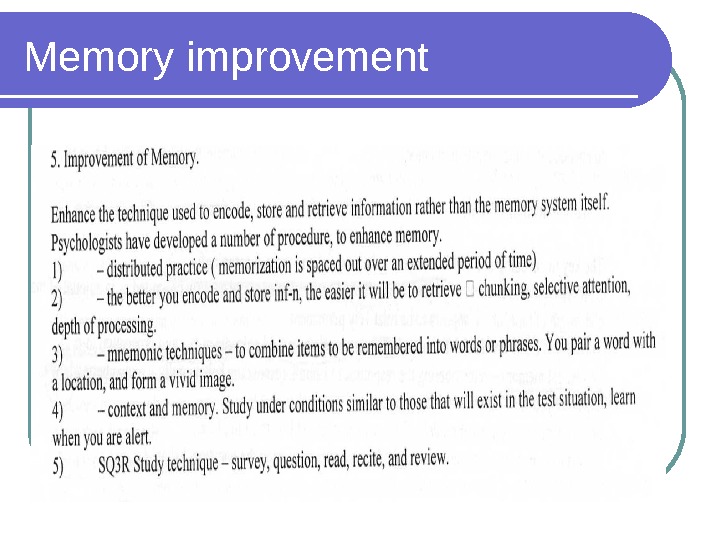
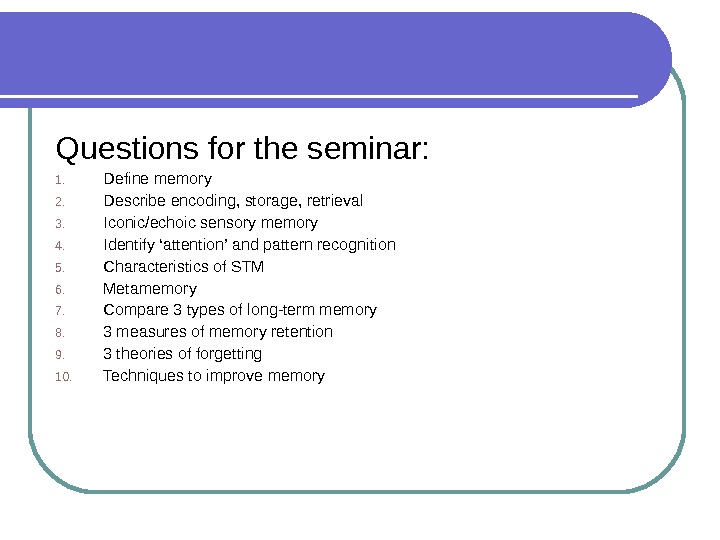
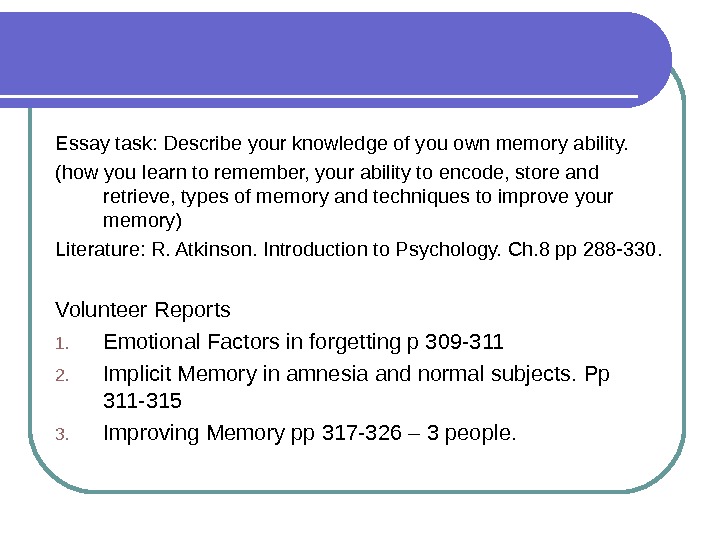
general_psychology_lecture_5.ppt
- Размер: 3.7 Mегабайта
- Количество слайдов: 16
Описание презентации General Psychology Human Memory Lecture 55 1. 1. по слайдам
 General Psychology Human Memory Lecture 55 1. 1. Definition of Memory 2. 2. Memory Processes 3. 3. Stages of memory storage 4. 4. Forgetting 5. 5. Improvement of memory
General Psychology Human Memory Lecture 55 1. 1. Definition of Memory 2. 2. Memory Processes 3. 3. Stages of memory storage 4. 4. Forgetting 5. 5. Improvement of memory
 In order to remember smth learn it! To test learning measure what is remembered! Memory involves storing information that is learned, so that it can be retrieved and used at a later time.
In order to remember smth learn it! To test learning measure what is remembered! Memory involves storing information that is learned, so that it can be retrieved and used at a later time.
 Retention level the amount of info stored after learning has taken place. Retention is measured by asking a person to retrieve previously learned info. Retention loss = forgetting a part of original learning that can’t be retrieved.
Retention level the amount of info stored after learning has taken place. Retention is measured by asking a person to retrieve previously learned info. Retention loss = forgetting a part of original learning that can’t be retrieved.
 Ebbinghaus Research H. Ebbinghaus demonstrated that a greater memory loss occurs in the first 20 min after learning than in the remaining 31 days. Savings score Time/Days App 100%- 80% App 60%- 50% 40%40% 35%35% 30%30% 25%25% 11 stst / immediate recall 11 stst / after 20 min 11 stst / after an hour 11 stst / after 9 hours 22 ndnd – 4 thth 66 thth — 31 stst
Ebbinghaus Research H. Ebbinghaus demonstrated that a greater memory loss occurs in the first 20 min after learning than in the remaining 31 days. Savings score Time/Days App 100%- 80% App 60%- 50% 40%40% 35%35% 30%30% 25%25% 11 stst / immediate recall 11 stst / after 20 min 11 stst / after an hour 11 stst / after 9 hours 22 ndnd – 4 thth 66 thth — 31 stst
 Memory processes
Memory processes
 Encoding (1 stst step) process of putting information into our memory system (like in a computer) Influences on effectiveness 1)1) Perceive it (hear, see, touch, smell, taste) 2)2) Motivated to remember 3)3) Find this info meaningful or relevant to our life 4)4) Practice or rehearse it
Encoding (1 stst step) process of putting information into our memory system (like in a computer) Influences on effectiveness 1)1) Perceive it (hear, see, touch, smell, taste) 2)2) Motivated to remember 3)3) Find this info meaningful or relevant to our life 4)4) Practice or rehearse it
 Storage (2 ndnd step) process of retaining information in our memory system for some length of time 3 memory stores Sensory short-term long-term SM (iconic/echoic) STM ( working active/immediate) LTM (semantic/episodic/procedural)
Storage (2 ndnd step) process of retaining information in our memory system for some length of time 3 memory stores Sensory short-term long-term SM (iconic/echoic) STM ( working active/immediate) LTM (semantic/episodic/procedural)
 Retrieval pulling information out of the memory system. We don’t know what is stored until we retrieve it. Sometimes it is adequately stored but not accessible at the moment. Success depends on effectiveness of encoding and storage.
Retrieval pulling information out of the memory system. We don’t know what is stored until we retrieve it. Sometimes it is adequately stored but not accessible at the moment. Success depends on effectiveness of encoding and storage.

 Memory stores characteristics
Memory stores characteristics
 Types of LTM Procedural Semantic Episodic Remembering The responses to stimuli How to do smth (riding a bike, being sick, eating a lobster) Mental models of the environment Access is automatic and retrieval involves answer, “What” (our dictionary) Highest memory system: events that have personal meaning (where? When? (our diary)
Types of LTM Procedural Semantic Episodic Remembering The responses to stimuli How to do smth (riding a bike, being sick, eating a lobster) Mental models of the environment Access is automatic and retrieval involves answer, “What” (our dictionary) Highest memory system: events that have personal meaning (where? When? (our diary)
 Forgetting – retention loss. To test the amount of forgetting use 3 measures of retention Recall (reconstruction) retrieve learned info from memory (essay, short-answer, fill-in-blank) Recognition Identify learned items and ignore new items that are used as distraction (true-false, multiple choice) Savings relearning
Forgetting – retention loss. To test the amount of forgetting use 3 measures of retention Recall (reconstruction) retrieve learned info from memory (essay, short-answer, fill-in-blank) Recognition Identify learned items and ignore new items that are used as distraction (true-false, multiple choice) Savings relearning
 3 theories of forgetting Decay A problem of storage, operate in STM ( if not rehearsed) Interference A problem of retrieval Motivated forgetting repression
3 theories of forgetting Decay A problem of storage, operate in STM ( if not rehearsed) Interference A problem of retrieval Motivated forgetting repression
 Memory improvement
Memory improvement
 Questions for the seminar: 1. Define memory 2. Describe encoding, storage, retrieval 3. Iconic/echoic sensory memory 4. Identify ‘attention’ and pattern recognition 5. Characteristics of STM 6. Metamemory 7. Compare 3 types of long-term memory 8. 3 measures of memory retention 9. 3 theories of forgetting 10. Techniques to improve memory
Questions for the seminar: 1. Define memory 2. Describe encoding, storage, retrieval 3. Iconic/echoic sensory memory 4. Identify ‘attention’ and pattern recognition 5. Characteristics of STM 6. Metamemory 7. Compare 3 types of long-term memory 8. 3 measures of memory retention 9. 3 theories of forgetting 10. Techniques to improve memory
 Essay task: Describe your knowledge of you own memory ability. (how you learn to remember, your ability to encode, store and retrieve, types of memory and techniques to improve your memory) Literature: R. Atkinson. Introduction to Psychology. Ch. 8 pp 288 -330. Volunteer Reports 1. Emotional Factors in forgetting p 309 -311 2. Implicit Memory in amnesia and normal subjects. Pp 311 -315 3. Improving Memory pp 317 -326 – 3 people.
Essay task: Describe your knowledge of you own memory ability. (how you learn to remember, your ability to encode, store and retrieve, types of memory and techniques to improve your memory) Literature: R. Atkinson. Introduction to Psychology. Ch. 8 pp 288 -330. Volunteer Reports 1. Emotional Factors in forgetting p 309 -311 2. Implicit Memory in amnesia and normal subjects. Pp 311 -315 3. Improving Memory pp 317 -326 – 3 people.

